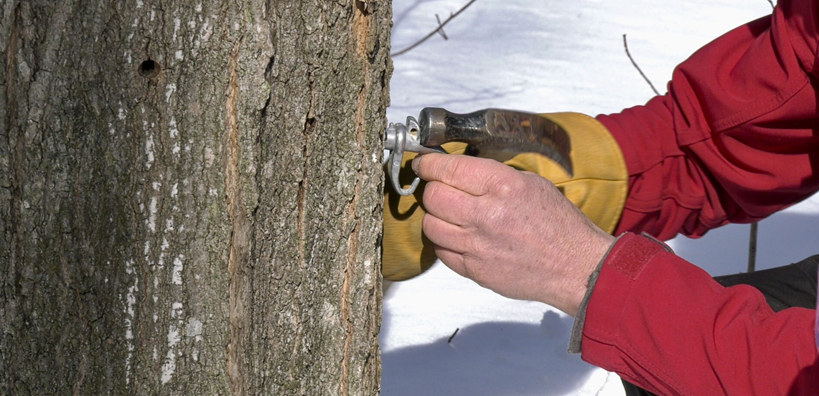Quebec maple syrup producers using gold nanoparticles to test quality
 Tapping a maple syrup tree at Elsie's Creek Farm in Coldwater, Ont., on Thursday, March 4, 2022 (Steve Mansbridge/CTV News)
Tapping a maple syrup tree at Elsie's Creek Farm in Coldwater, Ont., on Thursday, March 4, 2022 (Steve Mansbridge/CTV News)
The maple syrup we pour on our pancakes is the product of high-precision work, and its quality is scrupulously inspected before it's sold.
But sometimes, unwanted flavours can creep into the syrup and lessen its grade, much to the chagrin of maple syrup producers.
Fortunately, researchers at the Université de Montréal (UdeM), in collaboration with the Producteurs et Producrices acéricoles du Québec (PPAQ) and producers in the field, have developed an easy way to test the sap using gold particles and nanotechnology.
Gold particles as thin as one-hundredth the width of a hair turn red in the liquid where they rest. But when maple sap is added, the liquid turns blue.
"It's like a pH test, or a chlorine test for the pool," explains UdeM chemistry professor Jean-Francois Masson, who co-created the COLORI test.
The more drops you can add before the colour changes, the more likely the syrup will be of good quality.
This year, 250 seasonal kits were distributed as part of a pilot project, and researchers expect to invest more widely in 2024.
The technology allows producers to test for quality before "putting a lot of energy and time" into making their syrup, said PPAQ spokesperson Joël Vaudeville.
They can also sample and compare sap from different trees on the often-large properties.
Vaudeville says the test is "very simple to use" on-site, and an analysis grid is provided so producers can interpret the results themselves.
"It allows them to make business decisions."
According to the Canadian Food Inspection Agency, flavour defects "can be a trace of caramel, which is more common in amber or dark syrup, or a trace of sap of bud, which is more common in late-season syrups," among other things.
Defective syrups are usually used exclusively in processing plants and kept off store shelves.
There are four main classes of syrup. Golden, with a delicate taste, comes with the beginning of the maple season. As time progresses, the colour becomes darker and the taste more pronounced.
"With climate change, spring weather has become very variable," said Masson, adding that for the past ten years, producers have increasingly found "atypical flavour profiles," especially at the end of the season.
Research to further the test was published in the journal ACS Food Science & Technology.
This report by The Canadian Press was first published in French on Marh 26, 2023.
CTVNews.ca Top Stories

BREAKING Police to announce arrests in Toronto Pearson airport gold heist
Police say that arrests have been made in connection with a $20-million gold heist at Toronto Pearson International Airport one year ago.
LIVE @ 4 EDT Freeland to present 2024 federal budget, promising billions in new spending
Canadians will learn Tuesday the entirety of the federal Liberal government's new spending plans, and how they intend to pay for them, when Deputy Prime Minister and Finance Minister Chrystia Freeland tables the 2024 federal budget.
Proposed class-action lawsuit against Shoppers Drug Mart alleges 'unsafe and unethical corporate practices'
Shoppers Drug Mart is facing a proposed class-action lawsuit by current and former franchise owners at the retail chain who allege parent company Loblaw engaged in corporate practices that placed them in an “irredeemable conflict of interest” and put patient care at risk.
Lululemon unveils first summer kit for Canada's Olympic and Paralympic teams
Lululemon says it is combining function and fashion in its first-ever summer kit for Canada's Olympians and Paralympians.
Outdated cancer screening guidelines jeopardizing early detection, doctors say
A group of doctors say Canadian cancer screening guidelines set by a national task force are out-of-date and putting people at risk because their cancers aren't detected early enough.
Canada's health-care crisis was 'decades in the making,' says CMA
The strain placed on Canadian health care during the COVID-19 pandemic shows no sign of abating, and the top official of the Canadian Medical Association (CMA) is warning that improving the system will be a 'slow process' requiring sustained investment.
'I just started crying': Blue Jays player signs jersey for man in hospital
An Ontario woman says she never expected to be gifted a Blue Jays jersey for her ailing husband when she sat alone at the team’s home opener next to a couple of kind strangers.
Mussolini's wartime bunker opens to the public in Rome
After its last closure in 2021, it has now reopened for guided tours of the air raid shelter and the bunker. The complex now includes a multimedia exhibition about Rome during World War II, air raid systems for civilians, and the series of 51 Allied bombings that pummeled the city between July 1943 and May 1944.
B.C. woman facing steep medical bills, uncertain future after Thailand crash
The family of a Victoria, B.C., woman who was seriously injured in an accident in Thailand is pleading for help as medical bills pile up.
































